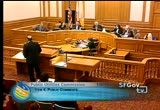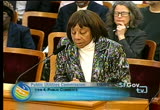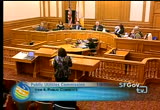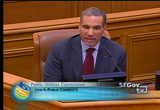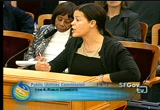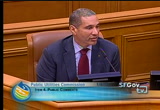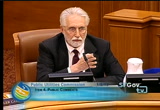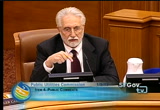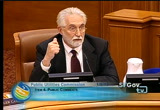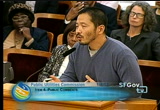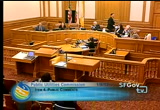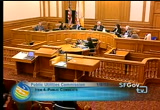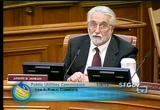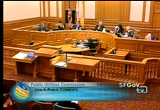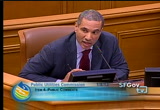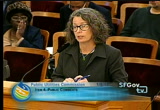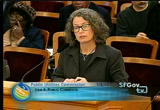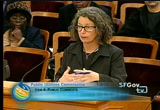tv [untitled] January 10, 2013 8:30pm-9:00pm PST
8:30 pm
>> ahead of the hearing? >> head of the hearing. >> great, thank you. dr. juanita dreier. thank you, good afternoon. president torres, vice president courtney and members of the commission. i'm here during the public comment part because what i have concerns about are within your jurisdiction and it's not on today's agenda. during the holidays i got many calls, many calls from students who had stories to tell me about why they were not going to be able to finish their ged degrees as a result of the southeast campus not having enough space for them, and also because of transportation issues and turf issues. i don't have three minutes, that's not enough time for me to talk about all the problems.
8:31 pm
but that's one concern. my other concern has to do with seniors who have been in the southeast -- on the southeast campus for quite a while and what's happening to them is they're being pushed out because there's a lack of space. and they were told that the puc needs the space. so, we have seniors and we have students who are not being given access to the southeast campus. so, what i'm asking you is to speak with someone about our concerns about the community and help us to resolve those issues. >> thank you very much, doctor. thank you. >> mr. kelly. >> so, one of the things i wanted to highlight is we went through a process that we went to the southeast. we talked about the programming of the whole facility. we talked about the reduction of space. we actually talked to the chancellor about, you know, the reduction of space.
8:32 pm
, and so, now since we're moving forward, now everyone is concerned about revisiting that, which, you know, that's what everyone wants. but, you know, one of the concerns we have is that we wanted to make sure that the puc be more responsible or making sure things happen in the southeast. we want to take more responsibility. and, so, we wanted to make sure that, you know, with city college, whatever space they have, they actually utilize. some of the issues that we were concerned about is subleasing. and, so, you know, i know that they are subleasing to hsaa, and they were actually making, you know, more money for subleasing to them. and, so, you know, when we now are looking at trying to work out a lease for them, it's becoming challenging. and i think the latest indication is they don't have funds to pay any rent at all.
8:33 pm
so, we're trying to have these conversations about how we can make all parties and make that a viable campus out there. so, i just wanted to let you know we have gone through a process, but we are willing to revisit it as well. julie, do you want to add anything? >> julia ellis, assistant [speaker not understood]. the only additional contact i would provide is if it makes sense to sit down with city college again, the numbers that we're working off of for the proposed renovation for the southeast community facility has city college assuming some 2000 square feet. we came to that number for what city college asked for. and, so, you know -- >> we have documentation that they do. [multiple voices] >> the chancellor at the time, it was the trustees, the cfo. and, so, if there's additional
8:34 pm
space that is desired, we are happy to have that conversation. i think that the challenge that we're finding now really is the general manager stated, in particular with city college is just because they've been subleasing, the impact for them is that they have been paying zero dollars out of pocket based on the subleasing relationship. and when they don't have that subleasing income moving forward, it's definitely seems significant. but the rates we're looking at, at the real estate department as well as the southeast commission and with the facilities commission of the southeast commission and the board president of the southeast commission is the very lowest end of industrial. and, so, it's not market rate. it's an industrial rate, which is -- and is at the very lowest end, $9 a square foot. there are folks in the building paying 34 cents a square foot. that's where the challenge lies. and the numbers we've been trying to generate don't include any recovery of the
8:35 pm
resources that have gone into the building [speaker not understood] the veneration, it doesn't include those types of things. so, we've been having many conversations and we can continue to do that and bring back a more thorough update soon. * renovation >> so, maybe instead of, why don't we bring the facts. we definitely know what hsa was paying. we know, you know, what the janitorial -- let's just come back with what the original arrangement was and then we can talk about the agreement that we had and show you the records that they agreed, city college agreed to a certain square footage. so, we can present that to everyone so that they don't think that we're just making this upedthv the only concern i have is that we move forward and then we have to move backwards. and i really want to get to a place where we start moving forward quickly. >> conception has begun.
8:36 pm
>> that's another thing, i really want to do something outstanding out there. * >> all right. we have to move on as well. thank you. and we'll expect that report, the leasing report as well. >> may i make a suggestion? >> yes. >> that when we do get the lease report, that deputy manager, is that your title? referenced that also at that time you bring communications around the space need for city college and that we do any kind of notice to make sure that anybody comes before us to talk about it at that time so things can continue to move forward, but that we get all the background information to make a decision on the a lease arrangements. >> excellent. >> thank you. >> mr. tony lee, our last public speaker comment. thank you for the opportunity to speak in front of you. my name is tony lee and i speak on behalf of my parents who are commercial property owners. about a month or two ago i came in front of the commission and
8:37 pm
i commented on the billing policies and processes of when bill come due and property owners are billed. and at that time i commented that i think that the process has hurt the policy owners -- the property owners. and since that meeting i guess sfpuc has written their recommendations on some of the processes that need to change. and, so, i'm here today because i wanted to make some comments on the recommendations and some clarifications. the one, the big -- the most important one is my -- my -- my feeling that it is very important to understand that when the dates are mentioned in this recommendation and the recommendation is one dated december 11, 2012. i'm not sure if you had abopportunity to read t but as
8:38 pm
you read t i'd like you to please keep thisv in mind. when they mention dates, that's 15 days, 75 days that notices are sent out, things like that, that does not include the fact that building cycles are actually two months. * and so, in our particular case, when we as property owners received our first notice that anything was wrong in the account, it wasn't 15 days or 75 days after water consumption. it was literally 135 days. when before the notice was even september out, which is almost five months. so, in other words, five months of water usage has actually occurred without the commercial property owner even knowing anything was wrong. and, so, just as a clarification, as you're reading the recommendation from sfpuc, please keep that in mind because it doesn't mention anything about that.
8:39 pm
that the billing cycles are actually 60 days. if you have two billing cycles, that's 120 days. and according to sfpuc, they state that, that lien notices cannot be sent out until two billing cycles later, but it doesn't really mention anything about the 120 days. the second thing is it mentions in there that they collect two months security deposit. perhaps that's the policy, but that's not what happened in our case. they collected from our commercial tenants $100, which maybe covered a day or two of water usage. so, that didn't happen in our case. and then lastly, i'm not too familiar with the actual language that says when lien notices can be sent out, but i'd like to point out something that may be a possibility,
8:40 pm
which is even though the law may saline notices can't be sent out until the second bill is past due, what about sending out notices. it doesn't have to be a notice, a lien notice. it could be just a postcard oring? something like that. so, lastly, to clear this up, in the proposal they say that they would send out something 45 days after the bill was due. that's still 75 days of water usage. 75 days of water usage has occurred then under that case under the new recommendation. and that's 2-1/2 months of water usage we'll have no control about. if they do collect two months' worth of security [speaker not understood]. technically they send it out -- the date they send it out is not the date we receive t. we receive it some days later so
8:41 pm
thank you for the opportunity to speak in front of you. >> so, who with have you spoken to on our staff? to todd and marge. and they're here. >> and they've been kind to you and open to you? [laughter] yes, they have. >> we want to make sure of that. in the beginning quite honestly, i was presenting some of these things what i said. i don't understand how so much water usage is going to occur when you're going to make someone else be responsible for it. how do you notify them for the first time five months later and how is that something that's acceptable? and then i had to come in here because they said they were following the policies. that's not to shun them in any way. i guess they were. so, now i had to come in and basically address whether the policy is fair or not. >> this is not an agendized item, correct? so, we're going to have to get
8:42 pm
some kind of response. what would be helpful to me is to have a linear graph of the various notice requirements because some of the issues mr. lee raised make a lot of sense to me. just real quick, too, i have printed out some copies of my general points which is addressing some of the changes i would like to see in there in the sfpuc's recommendation that they wrote to you on december 11. >> okay. so, if i could submit that. >> commissioner. >> yes, thank you, mr. lee. we do have a copy of the staff report that was part of the letter summary that was included in this meeting's package. and i did have a chance to look. i remember when you were here before and the basic question was how tropical storm a problem if a tenant can create a lien problem for a property owner without the property
8:43 pm
owner knowing. * they are trying to address that. one thing they do acknowledge is that the two-month billing cycle does create a slow down in information and we are in the process of trying to migrate toward a monthly billing cycle which should help that. one thing that i talked to mr. reid strong about yesterday was that in addition to the things that are in the report, it also would seem to be possible and i think administratively not terribly cumbersome for us to notify a property owner when an account is first opened by a tenant. * so that -- and as part of that notification, just to remind the property owner what the obligations are. so that if somebody is opening an account who is not authorized to open an account, if the lease needs to have
8:44 pm
provisions to protect the property owner from liability, that that could be taken care of by the property owner and the leaseholder. and it seems like that would be -- that's something i'm told is -- would be pretty straightforward to put in place. because our customer is the tenant, it is awkward. and i think what staff has tried to do is make as good an administrative accommodation to that as we can. part of the solution is to go to a monthly billing cycle which is in the works. and then if we can also in that process to include notification of a tenant opening an account that goes to the property owner, i think that would help as well. i think letting the property owner know would help. but i think practically commercial property owners, for instance us, we did know that
8:45 pm
they are opening the water account. but it's just that we didn't know they weren't paying it. so, that's really where the problem lies. and we gave them authorization to open the account. it says that in the lease. but 5-1/2 months later or five months later, that was the first time we even heard anything was happening. in our particular situation, we gave them 9 benefit of the doubt. they claimed that they were paying it. * i actually called sfpuc. this is more of a side thing. they told me they couldn't give me any account information which i thought was a little weird because they're making us pay for it. that turned into somewhat of a discussion. eventually we got information that in fact the tenant was lying to us. an additional month later. now six months later water has been could be suedv, several thousand dollars worth. at that point we started eviction processes. we gave them so many opportunities to pay. they didn't pay. they weren't returning calls
8:46 pm
literally that entire month. they didn't return a single call. and they actually technically left the space. we started that process and as you all probably know, that's a minimum of about three months, january like six months. so, six months of water usage and then another three to six months of additional water usage if they were still in the space, a year later, the property owner is paying a year's worth of someone else's usage. and, so, i think it's a great idea to move into the monthly. but if we're going to do that, some type of postcard or something can be sent out. >> okay, all right. that would help. >> i don't want this to turn into [speaker not understood]. so, we're going to get back and talk about these discussions. i understand that we're looking at a monthly billing situation. and if the owner's only response at this point is to go to small claims court, if that
8:47 pm
just to recover whatever you have not received, not only in water usage but for loss of rental income during that period of time that they no longer inhabit the space. okay. we don't need to unless you feel the urge to say something. all right, communications. i think we already know what that is. also i wanted to make sure commissioner caen, have you been informed about medicines? >> i've read what was in the binder. >> okay, all right. is that satisfactory i guess is what i'm asking? >> i think i would like a special notice sent to all safeway pharmacies. >> without objection, that shall be the order. >> actually, the program is a great program. it addresses a problem that has not found easy solutions
8:48 pm
before. i think there is -- the report we have indicates that it's running out of money at the end of the fiscal year, that they're working with the industry to try to get industry funding to continue that. there are several big pharmacies that if they could be worked into it, would certainly be helpful. safeway is one. kaiser is another. walgreens a third. but the more outreach and inclusion of various pharmacies, the better. i understand that there is an effort to do that and that there have been issues that have prevented it so far. i think that's something that as the program is renewed beyond july 1st, that that be continued to be a key part of the program, to expand it and make it as accessible as humanly possible. >> do you have a comment, commissioner vietor, on this? >> no.
8:49 pm
i'm pleased, too, to see the progress. i'm hoping the funding, there is a plan to continuing the program. i didn't see any reference to that. >> all right. >> i have a question on this. is there some way that we could work this program into disposing of medicines in the black container? >> [speaker not understood]. >> yeah, because, i mean, actually the black container is gone through because those things are not recyclable. and it seems to me that might be another efficient way of taking care of medicines. >> go to the landfill instead of the toilet. which is fine with me. [laughter] >> that's okay. not okay with me, though, because of the landfill issue. >> right, right. >> because there is absorption through the earth end stead of the water. >> that affect the aquifers as well. at the end of the day we should be going after the pharmaceutical.
8:50 pm
the producers of viagra last year made $67 billion -- 57 -- >> throwing that one away. [laughter] >> all right. i think we're off track. [laughter] >> all right. report of the general manager. >> on that note. >> move quickly. [laughter] >> so, the first thing i would like to report is to basically let you know that we have been in discussions with bosca about our water supply agreement. bosca has expressed some concerns about the water supply reliability of our wholesale customers, given the water and environmental plan that was on the ballot in november. so, we have been in conversations with bosca about how we might address their concerns. and we plan to bring this issue to the commission for
8:51 pm
consideration in january 22nd. >> all right. >> the next bit of news i would like to share with you is that we had a visitor here today. we had the u.s. epa administrator lisa jackson. she came by to take a tour of 5 25. she's on our west coast wing as part of our exit. and she really wanted to take an opportunity to look at our amazing building. she was very impressed with a lot of the amenities and the sustainability features that we have on our headquarters and she wanted me to relay a message to the puc and say that we should be proud of our tremendous accomplishment with our headquarter building. so, also would like to give an update on sf clean power. barbara? >> thank you, barbara [speaker
8:52 pm
not understood], assistant general manager for clean power. i have three items to address today. pg&e electric rate changes, the clean power sf timeline, and the packet of materials that i provided to you for context and relationship. so, the first item, pg&e electric rate change, you may have seen in the newspaper that pg&e's electric rates as well as their gas rates changed with the first of the year. those knewly approved rates went into effect and they do have -- because we're proposing the clean power effect program, they do have a bearing on that program. we can expect that prospective customers would see a smaller electric bill premium than we had projected because of the increased pg&e electric generation rates that went into effect on january 1st. pg&e's generation rate was 7.1 cents a kilowatt hour. that increased to 7.9 cents a kilowatt hour on january 1.
8:53 pm
pg&e explained that rate increase as being driven by high cost for acquiring clean renewable energy to meet their state mandates and as well as spending that had been previously approved by the cpuc for operating maintaining and upgrading their electric generation and distribution systems. so, those were the drivers behind the rate increase that san franciscans are feeling on the electric side. pg&e also stated that they foresee customers, electric customers likely facing another rate increase this may of about 2% to pay for electric transmission infrastructure improvements. so, the take away on that is for our clean power sf program at least is the premium that we projected clean power sf customers would pay is getting smaller. any questions on that item before i move to the second?
8:54 pm
>> the main one is a transmission increase? >> that's what they said in their press release, yes. >> that would not change the differential. >> that won't change the differential for clean power sf because we're only offering a generation service component, yes. but i think it's generally interesting for customers in san francisco so i mentioned it. >> so, how much less will the premium be given what we've been told before? >> so, we haven't completed the analysis of incorporating the numbers into what individual customers pay. >> we were discriminating. >> so, i'm telling you that's coming. >> okay. >> when we present to you our not to exceed rate recommendations, we will be refreshing all of that information for you and we'll show you the side by side anticipated projected comparison between pg&e rates and clean power sf generation rates. okay. the next item, then, was our
8:55 pm
timeline. in your packet is our timeline, and i just wanted to sort of give a yellow light. we're on track, but may be coming off track for some of the early steps that are interrelated. i think we're still overall on track for the program delivery because some of the tasks that we had scheduled serially will now overlap a little bit. so, we're not going to extend the overall timeline. but i did want to assure you that for activities that need to be brought to you in a coordinated way, to the extent one of the activity slips will flip everything so the coordination continues. i'm trying to be responsive to your concern, especially you, commissioner vietor, about really making sure that we really understand the full context and not just little bits and pieces. you want to understand how it fits together. so, for example, if our scheduled january 22nd presentation from local power on their business case analysis
8:56 pm
and their recommendation slips, we would slip other activities that are related to that. and then moving on to materials that were provided for context in relationship, there are eight separate documents that were provided to you. the focus of those together is preparing you for the not to exceed rate conversation that's to occur during this first quarter of 2013 and i'm happy to answer any questions about those. >> [inaudible]. >> our timeline shows our first conversation, our presentation to you of the rates on january 22nd. we will also have a presentation probably the 12th of february from -- on the rate fairness board. maybe that will flip depending on how pieces come together. >> i want to make sure we talk about a publicly -- we have read that, but the public needs to have an idea when we will be considering those issues. >> yes, we absolutely will be considering those issues
8:57 pm
beginning on january 22nd with a presentation from staff. you're welcome. >> that concludes my report. >> i actually have a question. i think it's for todd because there was a lot of information that was presented on the local power business plan. i don't know what it's called. and i just want to hear just briefly, because i know we're going to get more deeply into it at the next meeting, i assume, and kind of unpack that business plan a little bit more. but i just kind of want to hear your initial response to where it may fall short and where the opportunity might be. >> todd? >> todd vestrom, assistant manager cfo. i think it would fall short of a different proposal of what you as a commission felt comfortable and other city policy makers. and summarize those key differences. the idea is there would be a very much larger program and substantially all commercial
8:58 pm
and substantially all residential customers would be participants. and that that would require in order to do that scale the city borrowing up to a billion and a half dollars, specifically the san francisco public utilities commission borrowinging up to a billion and a half dollars. so, that's a very different assumption and a new risk that we have not received a green light from you or other policy makers to do. * the other key assumptions are there would be a large number of about 300 locally cited and city combined heat and power internal combustion engines. so, that's going to require a siting analysis be done along with 600 installations for solar panels. and that siting analysis is due from our contractors in january. so, that's an important part of your information you'll be receiving over the next few weeks. and then the other big thing is
8:59 pm
a relationship. and, so, the assumption is the city is borrowing money and the city is actually going into about 100,000 private properties, and the private property owners are willing to have a very long-term relationship with the cca and that long-term relationship would be required because the city would be borrowing money to do energy efficiency in those private properties and to install solar panels on [speaker not understood] the properties to install chp units, internal combustion chp units on top of, inside of, or next to about 300 buildings owned by private property owners in the city. so, it's not that it's a good or bad idea. it's just a very big different idea that would require a more risk and more money be borrowed by the city. >> there are two other assumptions i saw in there i wanted you to clarify if possible. one is
76 Views
IN COLLECTIONS
SFGTV: San Francisco Government Television Television Archive
Television Archive  Television Archive News Search Service
Television Archive News Search Service 
Uploaded by TV Archive on

 Live Music Archive
Live Music Archive Librivox Free Audio
Librivox Free Audio Metropolitan Museum
Metropolitan Museum Cleveland Museum of Art
Cleveland Museum of Art Internet Arcade
Internet Arcade Console Living Room
Console Living Room Books to Borrow
Books to Borrow Open Library
Open Library TV News
TV News Understanding 9/11
Understanding 9/11